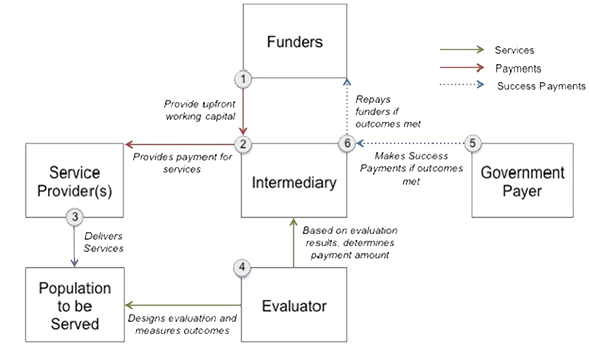Pay For Success
All across the world, governments are trying the Pay For Success model: financing a social intervention with private dollars from investors with repayment to the investors if the social intervention works. Endorsed by the Obama administration and implemented in policy areas such as criminal recidivism, chronic homelessness, and early childhood education, the Pay For Success model (below) is premised on a basic concept: that government should only pay for programs that work to move the needle on longstanding societal problems in the right direction.
In brief, the model states that private investors supply funding for intermediaries to contract with and pay service providers to deliver the intervention. After the intervention has been fully completed, an independent evaluator will determine if the intervention was successful in meeting an agreed-upon target. For example, did the intervention decrease juvenile recidivism by 10% in 5 years? If the intervention is found to be successful, the government repays the investors their money, as well as interest and a modest return on investment that accrued as part of the repayment agreement.

Source: Third Sector Capital Partners (2015).
Working with Harvard University’s Government Performance Lab, the City has secured technical assistance for 18 months to help develop a cutting edge Pay For Success pilot program, including identifying what kind of intervention should be implemented, what the target population will be, and how an intervention would be evaluated. The project is in the early phases of being determined – please check back for more updates as we have them.
To learn more about existing models, visit the following websites:
White House Office of Management and Budget
Social Finance
Third Sector Capital Partners
Center for American Progress
Governing Magazine
ReadyNation
Harvard University Government Performance Lab